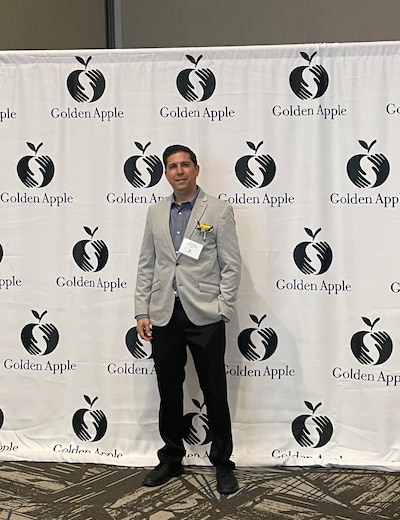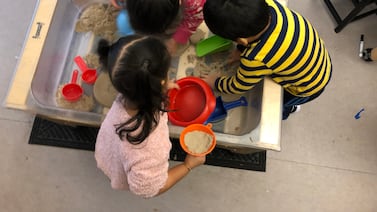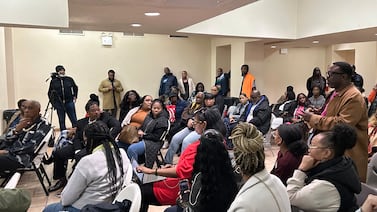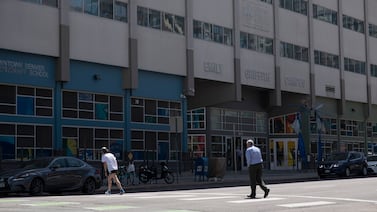Sign up for Chalkbeat Chicago’s free daily newsletter to keep up with the latest news on Chicago Public Schools.
Math teacher Victor Hurtado knows what it’s like to enter high school as a recently arrived immigrant.
After growing up in Durango, Mexico, he moved to Chicago as a teenager and enrolled in Schurz High School, which was then the only dual-language English-Spanish high school in the city.
Now, Hurtado serves as the math department chair teaching advanced algebra and AP Calculus at Schurz, which is now one of three dual-language high schools in Chicago Public Schools.
“I’m very passionate about my bilingual background,” Hurtado said. “I love my newcomers, and it’s a blessing to serve them.”

Hurtado was honored earlier this month as a finalist for the Golden Apple Awards for Excellence in Teaching. Chalkbeat spoke with him about supporting bilingual students, his favorite math lesson to teach, and what it’s like to navigate the current political climate around immigration.
This interview has been edited for length and clarity.
How did you decide to become a teacher?
I was working on my undergraduate degree at Northeastern University after I graduated from Wright College with an associate’s degree. While at Northeastern, I met this professor from Colombia, a wonderful man. I took computer science with him and he really inspired me to finish up my degree and work as a teacher. He founded a school that was for adults and he recruited me to help in the evenings teach adults mainly from Latino backgrounds. The school helped them to get their high school diploma, not the GED. It was such a wonderful experience that I will never forget. For nine months, every Thursday night, we’d volunteer. It was awesome.
Right after Northeastern, I got a job at Chicago’s Foreman High School as a bilingual math teacher, and while I was there, I eventually got my master’s degree at DePaul University. I was at Forman for 10 and a half years before coming to Schurz for the last seven.
What is your favorite lesson to teach, and why?
Being in the classroom for 17 years, there are so many great lessons in math that I could pick. This is my second year teaching AP Calculus, and I’ve always wanted to teach that class.
My favorite lesson is Riemann sums. It’s a method by a German professor, last name Riemann. It’s one of those AP Calculus topics that is a good introduction to derivatives. And kids discover and make connections between the formula and applying the geometry skills.
It is one of those topics that it’s very satisfying to see how the kids are able to sketch trapezoids, how they sketch rectangles. It’s all hands-on and they do explore, and it’s more like a discovery method for them to understand a much bigger theorem in Calculus.
Chicago has enrolled many recent immigrants in the past three years. How has that impacted your school and your teaching?
Ever since the results of the political elections, in our community, you see a lot of increasing anxiety among Latino families with ICE deportations taking place.
Thankfully, Chicago is a great city. We are a sanctuary city. We welcome people of all sorts of backgrounds. I do feel like I was welcome in Chicago and I think our newcomers, they do feel welcome. There’s a lot of support in place for them to kind of get accustomed.
Right now at the classroom level, particularly for our bilingual and ESL classrooms, we see an increase in the high levels of stress because it’s all over the news. I do try to talk about it when they ask, if they ask. We explain to the student, “Listen, don’t panic. Take a deep breath. ICE cannot come to your school without a [judicial] warrant.”
I openly had two conversations with the students recently, and the kids were very curious. They were very open. They were very polite. They were very reflective. Obviously, they were afraid of those things, and we tried to ease their concerns and guide them.
Our local school council is conducting a wonderful legal clinic on Saturdays. People are doing great things at Schurz advocating for our families.
Talk a little more about your own experience with school and how it affects your work today.
I’m a proud Schurz alumni. I’m very grateful for my bilingual background, and I feel very strongly about promoting dual language and bilingualism in our communities. I feel like Schurz was the place that I needed to be at the moment that I was here.
At Schurz, we have a great group of people who are doing a great job for our dual-language students. They’re very passionate about dual language and bilingualism. The educators do generally care about our students, and even our principal, Dr. Moran, she’s bilingual.
As for myself, I was in bilingual classes, but I was never offered the chance to take an advanced class in mathematics, and I understood why. Obviously, I didn’t have the skills to be in an advanced class. But now, this is what I advocate for my students.
I just did a workshop recently at a dual-language elementary school. I was presenting on how to build rigorous courses for our Latino and underprivileged students. It was truly an honor to be speaking about it and bringing in things that I’ve done in the classroom, based on my own experience, based on how I want to advocate for the students.
In my AP Calculus class, I recruited about nine bilingual students. I’m conducting Saturday review sessions. I’m doing this because I want to do it and the kids are showing up on a Saturday morning, nine in the morning until noon, just to talk about problems.
This is their third year in the United States. So they’re getting used to writing their responses in English, completely in English, and their writing has gotten much better. They’re so motivated. It has been such a powerful, empowering experience that I feel honored to be part of.
What’s the best advice you’ve ever received as a teacher, and how do you put it into practice?
I’ll go back to my years at Schurz. One of the best pieces of advice that I received was to go to a community college and start my education there. They offer a good bridge program for the students like myself, and they have a very affordable tuition, right? And now, they do offer the Chicago Star Scholarship, which is for students who excel, who have a 3.0 GPA, and it also applies undocumented students. Back when I was in school, they didn’t offer those things. So I’m so glad that they’re doing it now.
Mr. Sanchez, my high school social studies teacher, encouraged me to go to community college and get a degree. I’m so glad that he was able to inspire me. I try to do the exact same thing for the students today. I talked to them about going to see the college and career counselor; let’s see what scholarships are available to you.
How do you take care of yourself when you’re not at work?
I’m a sports fan, and I love playing volleyball. I played in high school, and now, I play with my friends, guys I’ve known for the past 20 years. So I play whenever I have a chance. This helps my mental health. People have to have something outside your job that is going to help [you] cope with the stress.
My two daughters got into volleyball, and this year, we’ve been doing travel team with them. They have played volleyball for the past three years. It’s one of the greatest experiences that I ever experienced as a father. Those girls are so passionate about the sport. They dive, they hit, they spike, they do a lot of things already that I was never able to do at a young age. It’s such a wonderful thing to see, and that really fills me with joy. That has been a blessing for them and for the family.
Becky Vevea is the bureau chief for Chalkbeat Chicago. Contact Becky at bvevea@chalkbeat.org.







